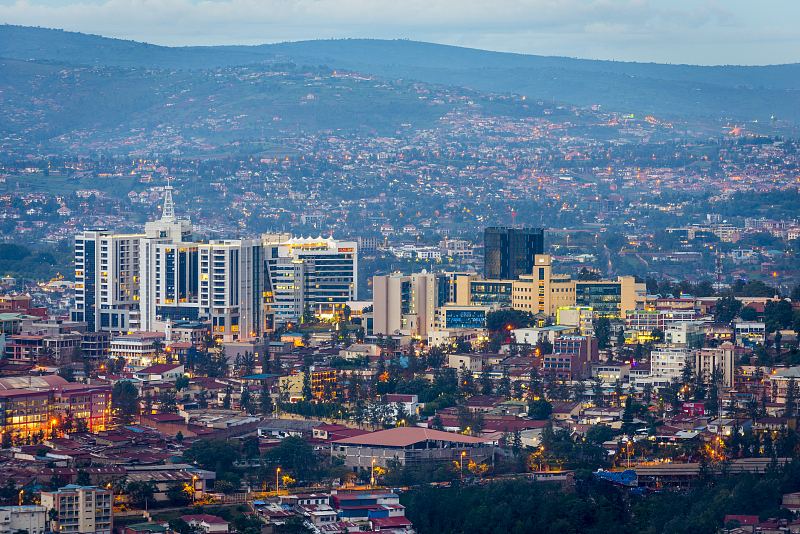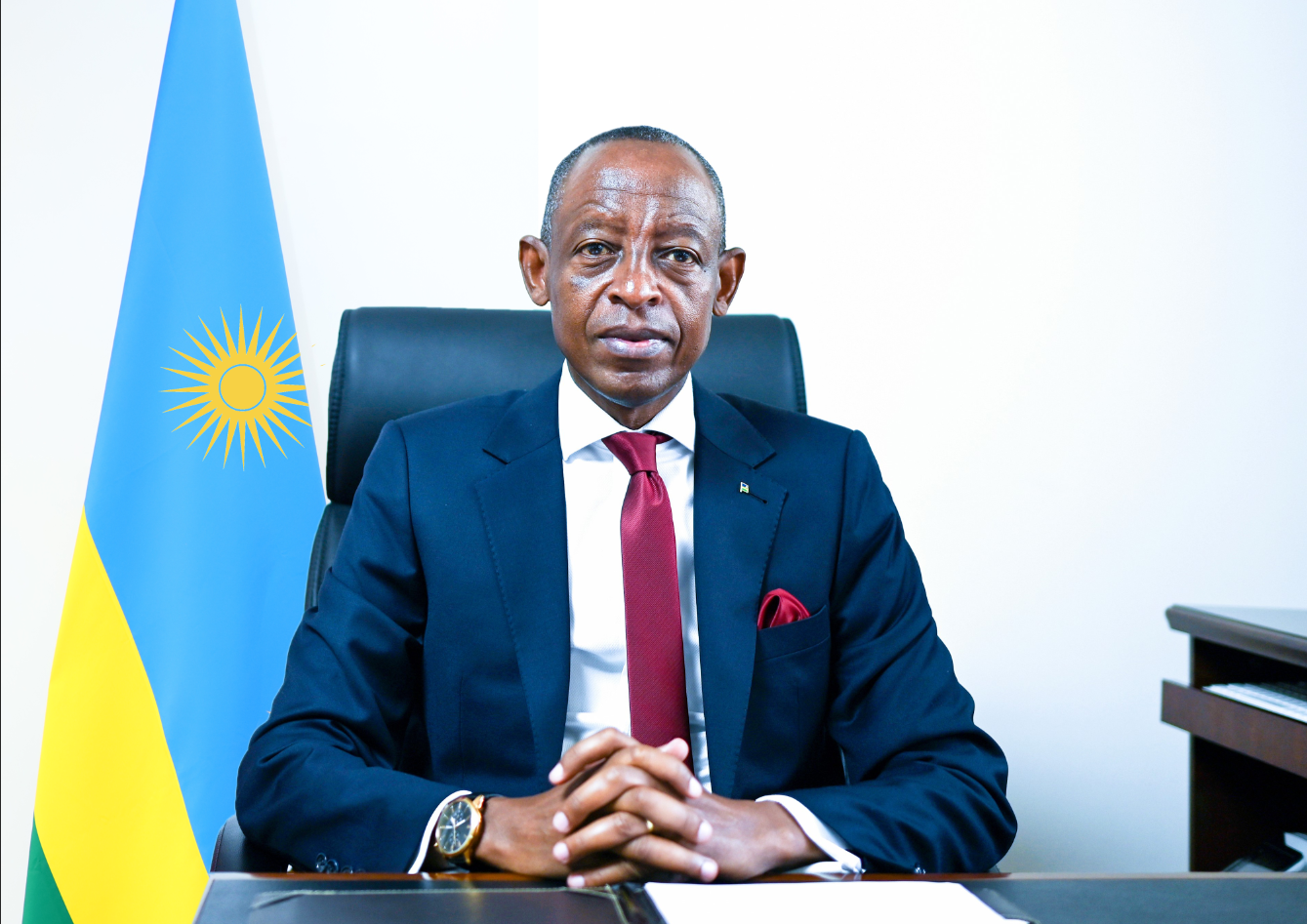China and Rwanda have cultivated a robust relationship marked by mutual respect and cooperation. Guided by the heads of state of both countries, bilateral ties have flourished. Rwanda, a proactive participant in the Belt and Road Initiative (BRI), has benefited from enhanced infrastructure and trade connections with China. In an interview with Global Times reporter Zhang Yiyi (GT), Rwandan Ambassador to China James Kimonyo (Kimonyo), discussed expanding economic and trade cooperation between China and Rwanda, highlighting new opportunities for bilateral collaboration.

Kigali, the capital of Rwanda Photo: CFP
GT: How has the Belt and Road Initiative (BRI) contributed to Rwanda's development since the country joined the initiative in 2018?Kimonyo: Rwanda and China have enjoyed warm and friendly relations, highlighted by high-level engagements. In July 2018, Rwanda signed several cooperation agreements with China, covering socio-economic activities, health, agriculture, trade, investment, and infrastructure.
The BRI aims to connect the world through infrastructure, financial inclusion, trade, and people-to-people exchanges. Numerous projects have been implemented in Rwanda, enhancing infrastructure, increasing trade between the two countries, and fostering people-to-people connections.
When you look at the portfolio of Rwanda in this particular initiative, China has immensely contributed to the development of Rwanda through different projects funded under BRI. Under the Forum on China-Africa cooperation, BRI also provides another avenue to provide resources to different African countries, including Rwanda.
We have seen growth in all those areas, especially in the area of infrastructure and health. We have hydropower infrastructure that has been developed. We have road infrastructure that has been constructed across the country in addition to hospitals and schools.
GT: Rwanda aims to become a middle-income country by 2035 and a high-income country by 2050. How will the BRI contribute to achieving these goals?
Kimonyo: Vision 2035 focuses on three strategic programs: infrastructure development, social development, and transformational governance. These pillars align with the opportunities provided by the BRI in social, economic, and governance development. Vision 2050 aims to transform Rwanda into a high-income country, emphasizing agriculture as an income-generating activity and addressing urbanization and globalization. The BRI supports these visions by providing resources for infrastructure and trade, facilitating Rwanda's access to the Chinese market, and contributing to economic transformation through technology and e-commerce. The BRI has been instrumental in supporting Rwanda's socioeconomic transformation through collaboration with the Chinese government.
GT: This year, China and Rwanda celebrate 53rd anniversary of diplomatic ties. How best to describe the relations between the two countries over the past decades?
Kimonyo: Bilateral cooperation between China and Rwanda has been highly productive, fostering mutual growth through various programs and initiatives. At our latest forecast session, we reported significant progress in ongoing projects. We look forward to the upcoming forum in Beijing, where Rwanda and other African leaders will discuss continued collaboration with China. This forum will review past commitments and plan for the future, focusing on infrastructure, agriculture, urbanization, technology, and people-to-people exchanges. Our goal is to ensure the forum's success, positively impacting lives and driving progress. We are pleased with the level of cooperation and eagerly anticipate continuing our partnership with China to achieve shared prospects.

Caption: Rwandan Ambassador to China James Kimonyo Photo: Embassy of the Republic of Rwanda
GT: Beyond agriculture, what other areas do you see for potential cooperation between the two countries in the future?Kimonyo: In recent years, we've collaborated closely with the Chinese government and appreciate their efforts in opening green lanes for African and Rwandan agricultural products to reach the Chinese market. China's initiatives have provided exclusive opportunities for African nations. Following expos, numerous contracts have been signed between Chinese and African companies, boosting the presence of Rwanda's product in the Chinese market. We've also utilized technology platforms through livestreaming to reach consumers and buyers. However, there is still a challenge of meeting the demand. We are therefore strategically engaging Chinese enterprises with the support of the Government of China to invest in agriculture to enhance production in coffee, chili, avocado, soya beans etc. We shall focus on technology transfer to add value in order to create jobs and significant economic impact. Other areas include mining sector, industrial development, infrastructure, energy development and education.
We are also trying to diversify our cooperation beyond market presence. Renewable energy is a focus to address environmental concerns, along with partnerships in healthcare to enhance human capital and technology.
Productivity is crucial for African countries, with over 70 percent depending on agriculture. We're working with China to increase production and introduce new products like avocados and minerals to the Chinese market. Collaboration with Chinese companies aim to improve mineral processing and enhance economic growth. We're also exploring partnerships in research and development, particularly in small industries, to join global value chains. Through collaboration with China, we're addressing socioeconomic needs and adapting strategies to meet specific country conditions. Our engagement aims to create diverse opportunities for mutual benefit, fostering common achievements through cooperation.
Regional infrastructure development is fundamental to cooperation and will significantly reduce transportation costs, fostering opportunities in manufacturing and other sectors. Ensuring a secure energy supply is crucial for increased productivity and exports within Africa. In addition to ongoing projects, prioritizing regional infrastructure, energy, and connectivity is essential to facilitate seamless transactions. We recognize China's leadership in technology and see significant opportunities in e-commerce and education collaboration. China's support for education, such as the Smart Education Project, underscores our shared commitment to innovation. Expanding such initiatives will leverage interconnected networks' benefits.
Strengthening trade ties with China is vital for our economic growth. We aim to enhance exports, attract investment, and develop manufacturing facilities. Chinese enterprises have thrived in our conducive business environment, reflecting the mutual benefits of our partnership. We welcome more Chinese investments in Rwanda's manufacturing sector, leveraging government-provided industrial parks and infrastructure support. Looking ahead, we are optimistic about the future of our collaboration with China. The commitment of both governments and the readiness of our people bode well for continued success. The growing presence of Rwandan businesspeople in China and Chinese groups in Rwanda demonstrates our strengthening bilateral ties. We remain open to further collaboration, investment, and business opportunities, ensuring a mutually beneficial partnership between our nations.
编者按:
中国和卢旺达建立了以相互尊重与合作为标志的牢固关系。在两国元首的引导下,两国关系蓬勃发展。卢旺达是“一带一路”倡议(BRI)的积极参与者,受益于与中国加强的基础设施和贸易联系。在接受《环球时报》记者张义奕采访时,卢旺达驻华大使基莫尼奥就扩大中伦经贸合作展开讨论了两国合作的新机遇。
环球时报:自2018年卢旺达加入“一带一路”倡议以来,“一带一路”倡议对卢旺达的发展有何贡献?
基莫尼奥:卢旺达和中国一直保持着热情友好的关系,高层接触凸显了这一点。2018年7月,卢旺达与中国签署了多项合作协议,涵盖社会经济活动、卫生、农业、贸易、投资和基础设施等领域。
“一带一路”倡议旨在通过基础设施、普惠金融、贸易和人文交流连接世界。卢旺达实施了许多项目,加强了基础设施,增加了两国之间的贸易,并促进了人与人之间的联系。
当你看到卢旺达在这个特别倡议中的投资组合时,中国通过“一带一路”资助的不同项目为卢旺达的发展做出了巨大贡献。在中非合作论坛下,“一带一路”倡议还为包括卢旺达在内的非洲国家提供了另一种资源来源。
我们看到所有这些领域都有增长,特别是在基础设施和卫生领域。我们有已经开发的水电基础设施。除了医院和学校外,我们还在全国各地建造了道路基础设施。
GT:卢旺达的目标是到2035年成为中等收入国家,到2050年成为高收入国家。“一带一路”倡议将如何为实现这些目标做出贡献?
Kimonyo:2035 年愿景侧重于三个战略计划:基础设施发展、社会发展和转型治理。这些支柱与“一带一路”倡议在社会、经济和治理发展方面提供的机遇相一致。《2050年愿景》旨在将卢旺达转变为高收入国家,强调农业是一项创收活动,并解决城市化和全球化问题。“一带一路”倡议通过为基础设施和贸易提供资源,促进卢旺达进入中国市场,以及通过技术和电子商务促进经济转型来支持这些愿景。“一带一路”倡议通过与中国政府的合作,在支持卢旺达的社会经济转型方面发挥了重要作用。
环球时报:今年是中国和卢旺达建交53周年。如何最好地描述过去几十年中两国的关系?
Kimonyo:中国和卢旺达的双边合作非常富有成效,通过各种项目和倡议促进了共同发展。在最新的预测会议上,我们报告了正在进行的项目的重大进展。我们期待着即将在北京举行的论坛,卢旺达和其他非洲领导人将讨论与中国的持续合作。本次论坛将回顾过去的承诺和未来规划,重点关注基础设施、农业、城市化、技术和人文交流。我们的目标是确保论坛的成功,对生活产生积极影响并推动进步。我们对双方的合作水平感到满意,并热切期待继续与中国合作,实现共同的前景。
环球时报:除了农业,您认为两国未来还有哪些合作领域值得关注?
Kimonyo:近年来,我们与中国政府密切合作,感谢他们为非洲和卢旺达农产品进入中国市场开辟绿色通道所做的努力。中国的倡议为非洲国家提供了独特的机会。世博会后,中国和非洲公司签订了许多合同,促进了卢旺达产品在中国市场的影响力。我们还通过直播利用技术平台来接触消费者和买家。然而,满足需求仍然存在挑战。因此,在中国政府的支持下,我们正在战略性地吸引中国企业投资农业,以提高咖啡、辣椒、鳄梨、大豆等的产量。我们将专注于技术转让以增加价值,以创造就业机会和重大经济影响。其他领域包括采矿业、工业发展、基础设施、能源开发和教育。
我们还在努力使我们的合作多样化,超越市场占有率。可再生能源是解决环境问题的重点,同时在医疗保健领域建立伙伴关系以增强人力资本和技术。
生产力对非洲国家至关重要,超过70%的国家依赖农业。我们正在与中国合作,增加产量,并向中国市场推出鳄梨和矿物质等新产品。与中国公司的合作旨在改善矿物加工并促进经济增长。我们还在探索研发方面的合作伙伴关系,特别是在小型行业,以加入全球价值链。通过与中国的合作,我们正在满足社会经济需求,并调整战略以满足特定国家的情况。我们的合作旨在创造互惠互利的多样化机会,通过合作促进共同成就。
区域基础设施发展是合作的基础,将大大降低运输成本,为制造业和其他部门创造机会。确保安全的能源供应对于提高非洲的生产力和出口至关重要。除了正在进行的项目外,优先考虑区域基础设施、能源和连通性对于促进无缝交易至关重要。我们认识到中国在技术方面的领导地位,并看到了电子商务和教育合作的巨大机遇。中国对教育的支持,如智慧教育项目,凸显了我们对创新的共同承诺。扩大这些举措将利用互联网络的优势。
加强与中国的贸易关系对我们的经济增长至关重要。我们的目标是增加出口,吸引投资,并发展制造设施。中国企业在我们有利的商业环境中茁壮成长,反映了我们伙伴关系的互惠互利。我们欢迎中国利用政府提供的工业园区和基础设施支持,对卢旺达制造业进行更多投资。展望未来,我们对与中国合作的未来持乐观态度。两国政府的承诺和我们人民的准备是好兆头持续成功。越来越多的卢旺达商人在中国和中国团体在卢旺达的存在表明,我们的双边关系正在加强。我们对进一步的合作、投资和商业机会持开放态度,确保我们两国之间的互利伙伴关系。













